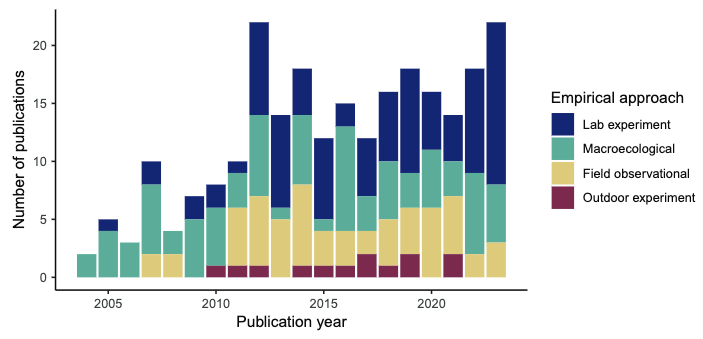
Figure 1: Trends in the focus of peer-reviewed empirical studies that explicitly investigate the effects of temperature on biological systems based on the metabolic theory of ecology (MTE). A Web of Science Core Collection search using the string “metabolic theory” AND “temperature” on January 5, 2024, yielded 636 citations published between January 2004 and December 2023. After excluding citations that were purely simulation based, theoretical, or did not test MTE, 246 were confirmed as studies that empirically tested MTE’s temperature predictions. Colors indicate the main empirical approach used in each study.
Abstract
The metabolic theory of ecology (MTE) aims to link biophysical constraints on individual metabolic rates to the emergence of patterns at the population and ecosystem scales. Because MTE links temperature’s kinetic effects on individual metabolism to ecological processes at higher levels of organization, it holds great potential to mechanistically predict how complex ecological systems respond to warming and increased temperature fluctuations under climate change. To scale up from individuals to ecosystems, applications of classical MTE implicitly assume that focusing on steady-state dynamics and averaging temperature responses across individuals and populations adequately capture the dominant attributes of biological systems. However, in the context of climate change, frequent perturbations from steady state and rapid changes in thermal performance curves via plasticity and evolution are almost guaranteed. Here, we explain how some of the assumptions made when applying MTE’s simplest canonical expression can lead to blind spots in understanding how temperature change affects biological systems and how this presents an opportunity for formal expansion of the theory. We review existing advances in this direction and provide a decision tree for identifying when dynamic modifications to classical MTE are needed for certain research questions. We conclude with empirical and theoretical challenges to be addressed in a more dynamic MTE for understanding biological change in an increasingly uncertain world.